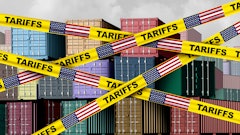Tempe, AZ — April 4, 2003 — The rapid spread of Severe Acute Respiratory Syndrome (SARS) in the People's Republic of China and other Asia-Pacific Rim countries threatens to derail the trillion-dollar global electronics industry, according to a report from technology consultancy Aberdeen Group.
SARS reportedly first appeared in Southern China late last year and has since infected some 2,270 people and been blamed for nearly 80 deaths in 16 countries, according to the World Health Organization. Numerous manufacturers in the region have reportedly shut down, and many companies have canceled executive trips to the region, even as financial analysts predict the virus will be a drag on economic growth worldwide this year.
The mysterious disease has come at a time of heightened global concerns over security in the wake of the September 2001 terrorist attacks in the United States and the more recent war in Iraq. Ironically, these factors also are arising against a background of growing numbers of enterprises outsourcing rising percentages of their overall operations, resulting in increasingly complex supply chains and prompting one technology consultancy to call on firms to develop "adaptive supply networks."
Electronics Industry Faces Disruptions
In its report on the electronics industry, Aberdeen asserted that with the health epidemic growing across Asia, manufacturing disruptions, travel bans and transportation delays related to SARS jeopardize the availability of semiconductors, electronic components, low-level assemblies and system product sourced in the PRC and nearby countries.
"For the past 18 months, digital consumer technologies such as wireless home networking gear have sold strongly and continue to be a bright spot," said Russ Craig, a digital consumer technology analyst at Aberdeen and co-author of the report, "SARS Virus Attacks the Electronics Industry."
"Unfortunately, most of this technology is produced in the Asia-Pacific region, and particularly the PRC," Craig added. "While global consumer demand is surging, the ability of suppliers in this region to provide the goods and services that support high levels of growth simply might not be there."
As an example, Craig noted that the PRC is a major source of AC-to-DC power supplies, the little black cubes that clutter users' power strips. "You can assemble a laptop elsewhere, but you cannot sell it without a power supply," Craig said. "Thus SARS threatens the supply of key component building blocks, not just the assembly plants."
Potential for "Nuclear Winter"
The SARS epidemic originated in China's manufacturing-rich Guangdong Province, home to many semiconductor and electronics firms, and is reportedly spreading through other key regions that supply the global electronics market. Components manufactured there end up in myriad consumer products, such as PCs, laptops, wireless networking gear, DVD players and televisions, all of which are also manufactured in the region.
Aberdeen cites examples of the early effects of SARS to date. Among the impacts: many Taiwanese companies are suspending travel to the PRC and Hong Kong due to health risks, and Compal, a major manufacturer of laptops for Dell and HP, has barred employees from those areas. Aberdeen research finds that U.S. semiconductors executives are contemplating delaying trips to the region.
Aberdeen also outlined scenarios that would cause significant disruptions to the global electronics industry, ranging from schedule slippages and disruptions in growth plans for global electronics companies, to a worst case of major supply chain disruptions and a potential "nuclear winter" for the semiconductor and electronics industry in the event that China were to be quarantined and manufacturing planners and logistics mavens working months to create qualified alternate production sources.
Craig noted that Western electronics firms will face significant challenges if their suppliers experience major disruptions. "These firms need to have contingency planning in place to mitigate the damage to [their profit and loss statements] should their suppliers have significant delays and disruptions," Craig said.
Travel Restrictions
Of course, SARS has had an impact on supply chain outside the electronics industry as well. For example, the International Security Management Association, a worldwide organization of chief security officers (CSO) with major international businesses, released a survey showing that a majority of its member companies are restricting travel to the Asia Pacific area due to concerns about SARS.
George Campbell, ISMA president, said 45.6 percent of his members reported that their companies were restricting travel to Asia Pacific countries to critical business or essential business only, and 12.7 percent have totally banned travel to Asia Pacific countries. Another 34.2 percent of the companies have no concerns and have issued no restrictions, while 7.6 percent are discouraging travel.
"The results of our recent survey are extremely indicative of the mood of businesses and security concerns for their personnel throughout the world," Campbell said. "The concern that a traveling executive will contract SARS while on business in the Asia Pacific region and return home to further spread the disease is a concern to almost half of the companies who responded to our questionnaire."
Companies indicating that they are restricting travel were location specific, identifying specific countries where SARS cases have been reported, like China, South China, Hong Kong, Vietnam and Singapore. Three companies identified travel restrictions to Toronto, Canada; two to Taiwan; and one to Indonesia. Many companies, according to the survey, are informing their employees to consult the U.S. Centers for Disease Control before scheduling a business trip.
Broader Impact on Supply Chains
In one small example of the potential economic affects of the disease, the Associated Press reported today that A.C. Moore Arts & Crafts, a chain of retail crafts outlets, disclosed in a filing the U.S. Securities and Exchange Commission that it believes SARS may disrupt its Asian supply chain, threatening the company's finances due to the potential difficulties in finding alternative suppliers.
In the broader perspective, financial analysts have predicted that the illness will be a drag on economic growth around the world. Reuters reported today that the Organization for Economic Cooperation and Development (OECD) this week has revised its forecast for the global economy, now predicting a recession, due to the impact of the war in Iraq, SARS and other uncertainties, and financial houses Morgan Stanley agreed that the disease would contribute to slowed growth in the world economy this year.
Call for "Adaptive Supply Networks"
Meanwhile, technology consultancy Forrester Research reported in a March research note that while companies are creating increasingly complex supply chains as they outsource greater portions of the overall operations, few companies have taken steps to prepare their supply chains for major disruptions.
In the report, "Preparing for Adaptive Supply Networks," co-authors George Lawrie, Matthew M. Nordan and Tha's Lapolla cite survey data showing that 25 interviewed companies are outsourcing, on average, just about 36 percent of their operations, up from 31 percent in 2000 and well on the way to the 49 percent of operations that companies expect to outsource, on average, by 2006.
It is not surprising, then, that fully 68 percent of enterprises in the Forrester survey reported that their supply chains have become more complex or much more complex in the past three years, and 64 percent report that their supply chains have become more or much more geographically extended over the same time period.
What is somewhat surprising, however, is that despite the availability of a number of supply chain optimization applications that could help companies deal with supply chain disruptions, 56 percent of the companies reported that they use no software for these purposes, and just 12 percent said they have software in place to alert them to disruptions. Another 28 percent said they use software to provide guidance to resolve disruptions, while only 4 percent have software in place capable of actually providing a solution to disruptions.
Forrester's analysts assert that enterprises, faced with relentless economic pressures to outsource, must become inherently more flexible to deal with the potential disruptions to their supply chains. "Forrester believes that companies will thrive by forming adaptive supply networks — business networks of supply chain partners that sense and respond in a coordinated fashion to changes in their environment," the analysts wrote, adding that software alone will not solve the problem. "Firms must first change their organizational approaches to favor flexibility and next modify their operating procedures to improve responsiveness to change. Only then does it make sense to implement new technology," they concluded.














